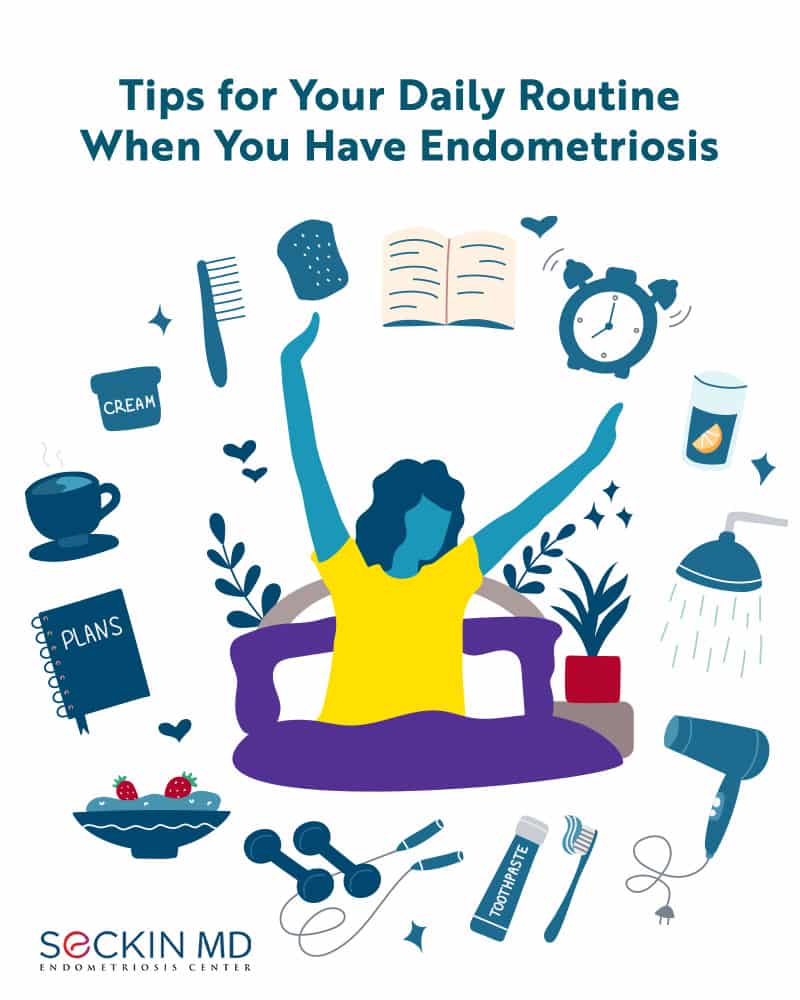Tips for Your Daily Routine When You Have Endometriosis

When You Have Endometriosis
Endometriosis is a chronic, progressive disease that can have profound effects on a woman’s quality of life. Symptoms of endometriosis such as pelvic pain, dysmenorrhea (painful menstrual periods), dyspareunia (pain with sex), and heavy bleeding can be hampering your day-to-day activities and make things difficult to cope with on both personal and professional fronts. Here are some tips for your daily routine that could help you manage endometriosis.
Maintain proper sleep hygiene
Proper sleep is important for maintaining the most vital functions in the body. Healthy sleep can set the tone for an active day. But endometriosis can negatively impact sleep quality. This in turn can lead to a number of other complications.
Practicing good sleep hygiene could help increase the quality of your sleep and help you manage your symptoms. Some of the ways to accomplish this include setting and following a defined sleep schedule and minimizing the evening and bedtime use of electronic devices that can delay sleep onset. See what works best for you and what does not. Consult your doctor if you experience disturbed or total lack of sleep.
Work on you emotional resilience
Emotional resilience indicates the ability to withstand and adapt to various stressors of life. Developing emotional resilience will not alleviate the symptoms of the disease per se. However, it can help you better cope with endometriosis and move forward with your daily routine.
Some of the ways to develop emotional resilience include building relationships and socializing with family and friends, avoiding negativity around you as much as possible, setting and focusing on your life and career goals, and taking part in community activities to keep yourself occupied. Perhaps you could include these activities in your daily routine.
Keep your mind and body fit
Uncertainties of endometriosis diagnosis and treatment can take a toll on your psychological and emotional well-being. Another factor that can negatively impact daily activities is fatigue, which is one of the characteristic symptoms of endometriosis. Fatigue combined with chronic pelvic pain can be very stressful and may even result in development of anxiety and depression.
Therefore, it is important to devise ways of coping with symptoms and work out ways to improve your quality of life. Practicing techniques such as yoga and meditation as part of your daily routine can help you maintain your calm, reduce fatigue, and even reduce your symptoms to some extent.
If symptoms are impeding your daily activities, your healthcare provider may also recommend recreational therapy. This can not only can improve your physical, cognitive, and emotional well-being but also help reduce your symptoms.
Switch to an anti-inflammatory diet
Endometrial tissues outside the uterus can elicit an immune response from the body in the form of inflammation. An anti-inflammatory diet may help minimize potential flare-ups and worsening of symptoms. An anti-inflammatory diet is a gluten-free, dairy-free diet with low levels of fermentable oligosaccharides, disaccharides, monosaccharides, and polyols generally referred to as FODMAPs.
Foods that you should avoid include alcohol, caffeine, processed foods, soy, red meat, grains, high-fat foods, high carbohydrate foods, and non-organic foods. Recommended foods include broccoli, almonds, avocados, leafy greens, fatty fish, and cherries, for example.
It is also possible to devise recipes that satisfy your craving but are still endo-friendly. You could try out some barbeque preparations such as paleo turkey burger with avocados or brunch recipes like grain and sugar-free chocolate chip scones.
Laparoscopic excision surgery for long-lasting symptom relief
All the methods described above, while useful, can only help in temporary relief. For a more long-lasting solution and complete symptom alleviation, it is important to get to the root of the problem.
Laparoscopic excision surgery is the gold standard for endometriosis treatment. Dr. Seckin’s team at the Seckin’s Endometriosis Center has the experience and expertise to identify and remove even the most hard-to-reach endometriosis lesions. Laparoscopic excision surgery combined with the management techniques detailed above can vastly improve your performance in daily activities and provide for a better overall quality of life.
Do you adopt any of these coping strategies in your daily life? Please share your experience and comment on our post on Facebook or Instagram.
Get a Second Opinion
Our endometriosis specialists are dedicated to providing patients with expert care. Whether you have been diagnosed or are looking to find a doctor, they are ready to help.Our office is located on 872 Fifth Avenue New York, NY 10065.
You may call us at (646) 960-3080 or have your case reviewed by clicking here.